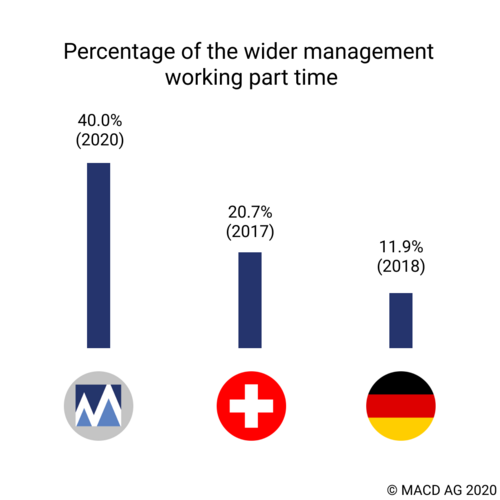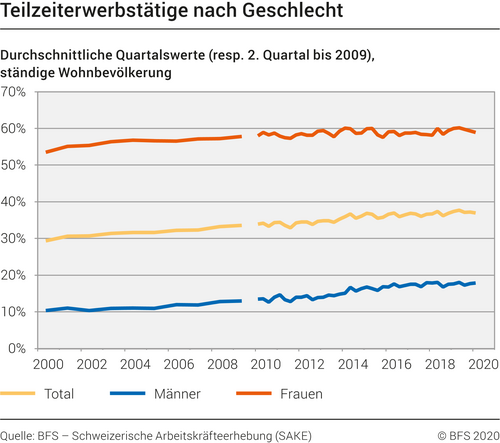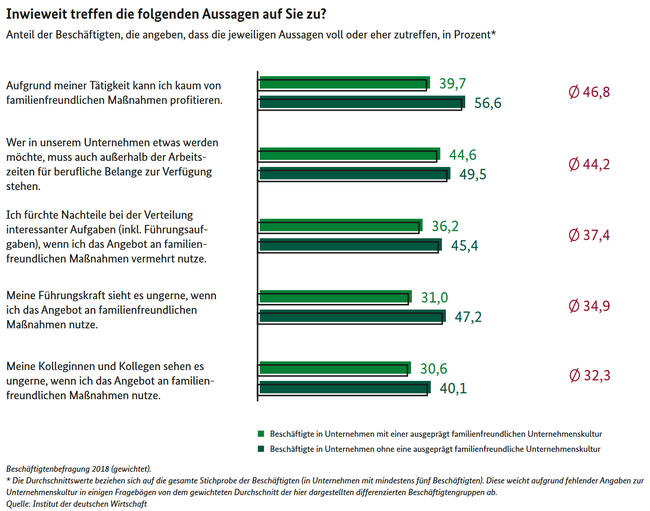Working part-time is becoming increasingly common. One of the reasons for this is the changing attitude towards work; many employees no longer choose their jobs primarily based on monetary goals, but rather look for a sense of fulfilment and a good work-life balance.
As head of a financial IT company I have been dealing with this issue for many years and would like to outline our view. I will also answer the question of whether it is possible to have a part-time career at MACD.
Does reducing the working hours really put the brakes on your career?
If we look at the statistics, it becomes clear that we already have large numbers of people working part-time in Switzerland and Germany. In Europe, Switzerland has the second-highest proportion of part-time workers with nearly 60% of women and just under 20% of men (graphic 1) In Germany, almost half of the women and every tenth man works less than 90%. By comparison: on average in the EU, around 30% of women and just under 9% of men work part-time.1
(Graphic 1, 2see Bundesamt für Statistik - Schweiz, 2020)
Looking more closely at the statistics, it becomes clear that in particular supporting roles and women are in part-time positions. Male management part-time positions are rare at most companies, but acceptance is increasing.
Management positions are often only advertised as full-time positions - maybe because companies are worried that employees working fewer hours will not be able to handle a management role. So it does seem to be the case that the career ladder comes to an end in many companies when one moves from a full-time to a part-time role.
Since the start, it has always been important to me that employees have a good work-life balance, and to provide a family-friendly work environment. So it is not surprising that we, at MACD, have quite a few part-time workers. In total 45 per cent of the teamwork part-time. Some work 50%, others 80% or 90%.
The reasons vary:
Some moved from full-time to part-time employment in order to study at university or to improve their work-life balance. Some started at MACD in a part-time role, for example because they were returning to work, or because they are studying.

(Gaphic 2 - Swiss figure, 3 see Bundesamt für Statistik, 2017 / German figure, 4 see Bundesagentur für Arbeit, 2019)
In our wider management team (stream leads and team leads), 40% currently work part-time, which is an outstanding figure in comparison to the German and Swiss averages (graphic 2). All members of our management team shape the company culture and take responsibility for their team. For us, more important than the number of worked hours is the know-how, motivation, and attitude. Consequently, we have decided to make every job available as either full-time or part-time.
So I can say: At MACD you can have an excellent career - whether you work part-time or full-time.
The biggest hurdle in moving to part-time
Through many conversations with our team and also potential employees, I know that independence and flexibility, alongside salary and job security, are among the most important criteria for choosing a job.
Many companies have realised that flexible working models are important. However, even at companies with a family-oriented outlook, many employees changing to part-time fear:
- being overlooked when it comes to interesting projects
- not being accepted by their colleagues
Interestingly, the biggest hurdle to moving to part-time is the employees' own feeling that they cannot reduce the number of working hours (graphic 3).
Why I count myself among the supporters of flexible working time models?
For me, the outstanding advantage is the motivation within the team. Many of the employees at MACD appreciate the ability to manage their time and the associated opportunity to combine work with other obligations. This breeds loyalty - we have many employees who have been with us for a very long time and our employee turnover is low.
At MACD, 55% of our team have been with us for 10 years or more.
And it has another positive effect on MACD as a company: we retain know-how, and the freedom to work on new projects generates new ideas that benefit the company. In the following example, motivation is closely linked to the ability to keep an experienced person in the company when they might otherwise have left:
Lucas Fowler, Head of our Software Engineering department, established the first MACD development office in Aachen with me 20 years ago. After his move to Switzerland, he took up a business analysis role at MACD and handed over the management of our Software Engineering team. Lucas had the long-standing dream to explore black holes and he got the opportunity to work in the Black Hole Astrophysics Group at the ETH in Zürich. Subsequently, he had the chance to begin a masters course at the University of Zürich.
And even though at first glance there are hardly any concrete connections between black holes and trading systems, I supported his wish. This is not just good news for Lucas but is also positive for MACD; it helped to bring in new ideas, and new energy into our team. Machine Learning and Artificial Intelligence - what an exciting field!
Lucas reduced his working time to 60 % for two years and studied for a Masters in Computational Science at the University of Zurich. In January 2020 Lucas returned to 100% and took over the management of our Software Engineering team.
Not everyone wants to study part-time, but I wanted to make this advantage available for MACD's employees who work full-time, too. Therefore, I introduced a corporate policy: at each 5 year anniversary, the team member gets an additional amount of vacation days. For your 5th anniversary you get five extra days holiday, for your 10th ten days, and so on.
These extra days are intended as an opportunity for the MACD employees to do something special that they would not otherwise have had the time to do. I myself have already taken advantage of this; for a trip through Vietnam.
I can recommend to everyone to have such an enriching experience outside of the normal job.
How do we manage the balance between reliability and flexibility?
As a mission-critical software provider for our customers, we have to provide reliable systems. Not only our systems but also our support team must be available from morning to evening to provide the personal touch and to quickly help when customers have requests or problems.
For us, it is in our DNA to monitor systems and to be on call before trading begins, in order to tackle and communicate in the event of problems. To solve complex problems, the experts in our software engineering team are ready.
Flexible working hours and a high number of part-time workers require a high degree of communication and planning. So we need to implement measures at various levels to establish the necessary conditions. Here are three of them:
We created a new position 'MACD Project Office', which we were able to fill with our new team member Cindy Fuhrer last December. Cindy is mainly involved in supporting and improving project planning and communication.
A further step towards flexible project planning is that we introduced KANBAN to improve the transparency of projects.
Of course, it is also very important to create the technical prerequisites for good communication. In February, we installed a new digital telephone system that provides screen sharing, video functions and virtual meeting rooms in addition to normal telephone calls.
Especially in this extraordinary situation caused by the Coronavirus and the resulting heavy use of home office and flexible working hours by employees and customers, we are very happy that we took these steps.
In the current Corona times, it is very important to focus on internal communication. Every team leader holds regular team meetings to bring the team together and answer questions or proactively address issues. In regular meetings, all team leaders exchange information and work out solutions together. In our MACD Company Meetings as well as in our coffee talk rounds for all employees, information is passed on by the management and employees can give feedback or ask questions. It is important that we all maintain the same level of knowledge and that every employee is actively involved.
It is clear to me that the optimal handling of the flexible model is a process that we, as a team, have to revise and improve again and again.
In these difficult times, flexible working is particularly important. I strongly believe that this flexibility is exactly what made us so strong during the recent crisis; our team was ready to put in the extra hours to move to a home office environment and tackle the challenges that we suddenly faced.
"We are human."
To summarise: the successful implementation of flexible working models requires the involvement of all employees.
It is important to know what exactly the needs of the employees are. Under no circumstance should those who have no need for part-time work, home office etc., be left out of the loop.
In order to develop a balanced and appropriate model, the most important thing is to create acceptance both on the part of management and all employees - and ensure that this does not cause friction within the team. This point is linked to one of our own guiding principles: "We are human."
In our daily work and project planning, we always focus on people in addition to our business goals. Because our employees are the basis of our success. So we maintain a respectful, open and honest relationship with one another and consider each individual's needs.
More Blog PostsLearn more about MACD
List of Sources
1 see EU - Teilzeitquoten nach Geschlecht 2019: in: Statista, 05.2020, [online] https://de.statista.com/statistik/daten/studie/1098738/umfrage/anteil-der-teilzeitbeschaeftigung-in-den-eu-laendern/#professional [04.08.2020]
2 see Bundesamt für Statistik: Teilzeiterwerbstätige nach Geschlecht, in: Bundesamt für Statistik, 14.05.2020, [online] https://www.bfs.admin.ch/bfs/de/home/aktuell/neue-veroeffentlichungen.assetdetail.12647246.html [04.08.2020]
3 see Bundesamt für Statistik: Teilzeiterwerbstätigkeit in der Schweiz 2017 - Schweizerische Arbeitskräfteerhebung (SAKE) | Publikation, in: Bundesamt für Statistik, Schweiz, 17.01.2019, [online] https://www.bfs.admin.ch/bfs/de/home/statistiken/arbeit-erwerb.assetdetail.7106889.html [11.08.2020].
4 see Bundesagentur für Arbeit: Grundlagen: Methodenbericht April 2019 - Beschäftigte mit Leitungsfunktion, in: statistik.arbeitsagentur.de, 04.2019, [online] https://statistik.arbeitsagentur.de/DE/Statischer-Content/Grundlagen/Methodik-Qualitaet/Methodenberichte/Beschaeftigungsstatistik/Generische-Publikationen/Methodenbericht-Beschaeftigte-mit-Leitungsfunktion.pdf?__blob=publicationFile [11.08.2020].
5 see Bundesministerium für Familie, Frauen, Senioren und Jugend: Unternehmensmonitor Familienfreundlichkeit 2019, in: erfolgsfaktor-familie.de, 07.2019, [online] https://www.erfolgsfaktor-familie.de/fileadmin/ef/data/mediathek/BMFSFJ_Erfolgsfaktor_Infothek_Unternehmensmonitor.pdf [04.08.2020]




